Stay in the know on all smart updates of your favorite topics.
Moving from a linear to a circular economy means minimising the waste and pollution by reducing, recycling and reusing. The City of Amsterdam aims to redesign twenty product- or material chains. The implementation of material reuse strategies has the potential to create a value of €85 million per year within the construction sector and €150 million per year with more efficient organic residual streams. Amsterdam set up an innovation program on the circular economy; www.amsterdamsmartcity.com/circularamsterdam. By converting waste into electricity, urban heating and construction materials, the Amsterdam Electricity Company generates 900 kWh per 1000 kg of waste. 75% of the sewage system is separated for waste and rain water and the silt which remains after treating waste water is converted into natural gas. Share your innovative concepts and ideas on circular economy here.
Amsterdam Biochar Initiative

Biochar is a soil amendment made typically from bio-mass through a process called pyrolysis with low-oxygen. By using a low-cost, easy-to-make biochar stove, communities can arrange to turn common waste products into biochar.
The vision behind this project is for healthy and resilient communities. This means that I prefer methods that promote local, DIY and community approach, so that it can quickly scale and adapt to different towns/cities.
Most importantly, carbon being the element behind Life has tremendous versatility. It can be used to filter water and then used as a soil amendment. Or it can be mixed to make better concrete composites for roads (asphalt) and concrete. It can improve manufacturing by making carbon fiber alloys.
Last but not least, it is done through a circular model of using waste such as wood sticks, bio-mass, paper, saw dust mills, anything with carbon, even plastics. The output heat can be captured for heating buildings and cooking stoves. The opportunities are endless.
Sizes of stove vary in function of available supply/demand dynamics. For more information, check the biochar-international.org or Ithaka International.
Thank you.
PS: Stockholm, Sweden has achieved this recently. If the Swedes can do it, we can learn from them and improve together!
http://www.nordregio.org/sustainable_cities/stockholm-biochar-project/
Some guidelines for background and context
https://www.biochar-international.org/wp-content/uploads/2018/04/IBI_Pyrolysis_Plant_Guidelines.pdf
SDG Meetup #10 x Young Impactmakers | SDG 14: Life below Water

In September, during the SDG Action Day, we will be focusing on SDG 14: Life below Water. This special edition of our SDG Meetup is developed in collaboration with our Young Impactmakers community.
| SDG 14
According to the UN, oceans absorb about 30 per cent of the carbon dioxide produced by humans, and we are seeing a 26 per cent rise in ocean acidification since the industrial revolution. Marine pollution is reaching alarming levels, too, with an average of 13,000 pieces of plastic litter per square kilometre of ocean. That's why SDG 14 aims to sustainably manage and protect marine and coastal ecosystems from pollution, as well as address the impacts of ocean acidification.
| CONTRIBUTORS
Stay tuned for speakers!
| PROGRAM
18:30 - 19:00 Walk-in (grab a drink)
19:00 - 21:00 Event (learn - innovate - co-create)
21:00 - 21:30 Networking drinks
| WHAT IS THE SDG MEETUP?
The Sustainable Development Goals Meetup is a monthly meetup powered by SDG House Residents Impact Hub Amsterdam and C-Change.
The SDG Meetup series provides a continuous engagement opportunity to accelerate solutions per SDG and develop shared knowledge and resources. It is also an accessible collaboration platform for established organisations, impact entrepreneurs, SMEs, institutions and independent professionals who want to learn about and work on the SDGs in an entrepreneurial way.
Each edition focuses on one SDG (i.e. gender equality, climate change). It is an interactive evening event meant to generate new ideas, connections, collaboration and action. At each edition we invite knowledge partners, entrepreneurs, innovators and expert facilitators to co-create an inspiring environment for us.
The learnings of each meetup are shared with the public through a blog series.
| WHERE?
The meetups take place at Impact Hub Amsterdam located in the SDG House (KIT Royal Tropical Institute) in Amsterdam Oost. SDG House, as a community, houses over 1000+ professionals and 50+ organisations working on or with the SDGs.
Plastic Waste Recyling
Hi everyone!
I am Enrico, office coordinator for a startup of e-scooter sharing. I am looking for companies who can collect and reuse our plastic waste and turn it into swags and other objects and create nice cooperation around plastic reuse. We are also looking for a partner in handling our organic food waste to create compost!
Thank you all!
nes.city
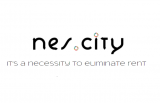
A global network of shared equity rent-to-own properties, offering liquid equity transferring to other properties globally. This will be as if the tenant is co-investing into a 'green REIT' fund along with CSR programs and NGOs, which we will use the crowdfund purchasing new properties, or reinvesting into sustainable urban development, and social entrepreneurs. The vision is to make a new type of bank persay, that offers an AirBnB+WeWork but connected with more community initiatives, like co-living spaces do, however we want to focus on spurring economic development and sustainability for low-medium income communities.
Looking for collaborators to work together and spread this vision.
Add me on LinkedIn and let's chat:
linkedin.com/in/alanjgreenspan
Vacature Stagiair Content Creation bij vanPlestik
vanPlestik zoekt een enthousiaste content creator / media & communicatie stagiair(e) met talent voor fotografie!
Tijdens deze stage werk je aan externe communicatie in tekst en beeld voor diverse projecten van vanPlestik. In een korte tijd leer je veel over het werken in een klein maar ambitieus bedrijf en zie je van dichtbij hoe onze producten en projecten tot stand komen. Je werkt in een dynamisch, klein en hecht team en krijgt veel verantwoordelijkheid en natuurlijk de nodige begeleiding.
Nieuwsgierig? Lees meer over de stage en hoe je hierop kunt reageren in de bijlage.
Event recap: 'The circular economy: moving beyond the inner circle'
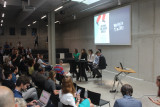
A city that produces virtually no waste...? This is the goal the City of Amsterdam hopes to achieve by 2050 through switching to a circular economy. How can the circular economy be beneficial for everyone, and not just the front runners? These issues were the topic of the Beyond the Inner Circle conference that took place during the second day of the WeMakeThe.City festival on June 18th 2019. A recap by our special reporter Ellie Roy.
A city that produces virtually no waste...? This is the goal the City of Amsterdam hopes to achieve by 2050 through switching to a circular economy. Many circular initiatives are already being developed and implemented by entrepreneurs and policy makers. However, for real progress to be made, more collaboration is required. At the same time, the social implications of such a paradigm shift must be considered. How can the circular economy be beneficial for everyone, and not just the front runners? These issues were the topic of the Beyond the Inner Circle conference that took place during the second day of the WeMakeThe.City festival on June 18th 2019.
Platform for circularity
The conference was held at CIRCL, constructed by ABN AMRO. The circular economy was at the centre of the building’s design, with almost all construction materials being either second-hand or easily disassembled and reused. For instance, the insulation is made from 16,000 pairs of old jeans and the window frames are reclaimed from disused office buildings. The initiative aims to act as a platform for society to meet, share knowledge and debate important issues in order to create a sustainable future. In other words, a great location to discuss the future of the circular economy.

Using nature as inspiration
Eyab Sayed, founder and director of innovation at BIOHM, was one of the first to speak. BIOHM takes inspiration from nature to develop bio-based building materials and circular construction systems. The company has already developed a replacement for plywood made from food waste and a completely fire-resistant insulation material made from mycelium (the vegetative part of mushrooms). Using their circular construction systems, materials could be returned to the producer at the end of their life cycle and then be reused, or simply be allowed to biodegrade. Eyab shared many pertinent messages with the audience. One of the most striking was: “nature does not develop in isolation and neither should we”, showing the importance of collaboration.
It’s a match!
Another interesting innovation was presented by Maayke Damen, MIT innovator under 35 and founder of the Excess Materials Exchange. She has developed an online platform through which waste materials can be exchanged and repurposed, or as she calls it: a “dating site” for waste materials. This platform works by following materials through their lifecycle by using resource passports and tracing identifiers such as QR codes. This allows the best secondary use to be determined based on the environmental, societal and financial impact. For instance, coffee grounds are found to be best repurposed as ink and orange peel as livestock feed. An initial pilot scheme conducted on 18 different waste streams was found to generate 1 billion euros of total value - who would have thought that “waste” could actually be so profitable!
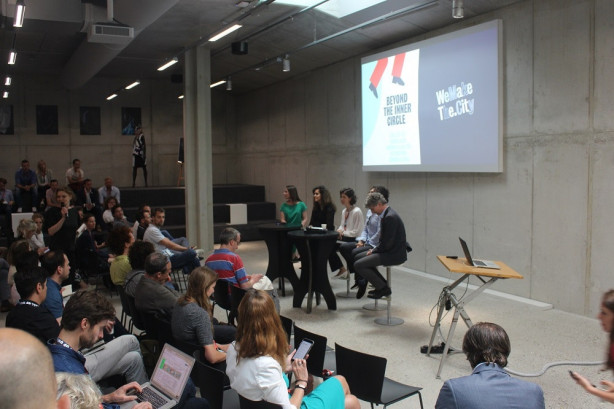
Teaching old industries new tricks
New innovations are clearly needed to drive the circular economy but, in order to make Amsterdam fully circular in the future, old industries will also have to adapt. James Hallworth, manager of circular and renewable industry at the Port of Amsterdam, explained the steps that are being made to ensure this happens. Due to its location at the centre of logistics and recycling facilities, he considers the port to be in the “perfect position to be involved in the circular economy”. In the last years, the port has developed a number of circular building hubs which aim to stimulate collaboration in circular initiatives. One of these initiatives is the Amsterdam Logistic City Hub. It’s goal is to provide a solution to Amsterdam’s logistic problems by using the city’s canal network to transport goods and passengers. Perhaps not a fully circular project in itself, but this would certainly help to reduce pollution and facilitate other circular initiatives within the city.
Making circularity part of policy making
In order for the Netherlands to reduce its environmental impact, many agree that the circular economy will need to become a standard part of government policy. Jolein Baidenmann, commodity director for the Metropolitan Region of Amsterdam, gave insights into the circular economy policy-making. She says that the circular economy is “much broader than just raw-materials and resources”. It is also related to social injustice and, if implemented correctly, could benefit all members of society. Currently, circularity is mainly restricted to one-off projects. Jolein believes the concept should become part of standard process and be given the experimentation space that it requires. The audience had many questions on how this could be achieved. She suggested that perhaps a Circularity Act, similar to the Climate Act (in Dutch: Klimaatwet), would be one possibility.

It is clear that progress is being made towards a fully circular economy however, a lot still needs to be done to achieve this by 2050. The conference provided a great opportunity for stakeholders from different backgrounds to exchange both ideas and expertise, allowing everyone’s circle to become a little broader and further progress to be made.
Text and photos: Ellie Roy
‘Roetz Bikes’ en ‘Excess Materials Exchange’ winnaars prijsvraag ‘Digitaal en Circulair’
Roetz Bikes en Excess Materials Exchange zijn de winnaars van de competitie ‘Digitaal en Circulair’ van de Metropoolregio Amsterdam. De competitie, begeleid door de Stad Amsterdam als aanbestedende dienst en voorbereid door de Amsterdam Economic Board, is uitgeschreven om circulaire initiatieven, die op dit moment nog in de kinderschoenen staan, te helpen hun innovaties verder te ontwikkelen. Aan de prijsvraag is een geldbedrag van in totaal € 750.000 verbonden.
Building blocks towards a new strategy Circular Amsterdam 2020 - 2025 approved (in Dutch)
Het Amsterdamse college van burgemeester en wethouders heeft vorige week kennis genomen van het rapport ‘Bouwstenen voor de nieuwe strategie Amsterdam Circulair 2020 – 2025'. Het college stemt in met het verder uitwerken van 17 ontwikkelrichtingen voor het circulair maken van de waardeketens bouw, biomassa en voedsel en consumptiegoederen. Deze richtingen worden dit najaar met stakeholders verder uitgewerkt tot de nieuwe strategie circulaire economie, met bijbehorend uitvoeringsprogramma. Zo wordt circulaire economie zichtbaar en tastbaar in de stad. Want de toekomst van de Amsterdamse economie is circulair en dat wordt uiterlijk in 2050 gerealiseerd.
Verder zijn we ook gestart met het gesprek met de stad hierover. Allereerst in West en Zuidoost, andere buurten volgen binnenkort ook!
Meer informatie: www.amsterdam.nl/duurzametoekomst
Zero Waste Zuidas 2030
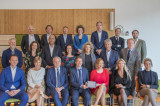
At the annual Green Business Club Zuidas CEO breakfast, 25 CEO's of Zuidas companies signed an agreement on becoming "Zero Waste" by 2030. This initiative is a collaboration with Amsterdam Economic Board. (Dutch)
Tijdens het jaarlijkse Green Business Club Zuidas CEO-ontbijt ondertekenden 25 CEO’s voor een Zero Waste Zuidas in 2030. Het doel: een circulaire Zuidas waar elk restproduct weer het begin is van iets nieuws. Voedsel, grondstof, herbruikbaar materiaal en uiteindelijk energie.
Fred Bos, Senior Managing Director van ABN AMRO licht toe waarom zij een van de initiatiefnemers zijn van Zero Waste Zuidas: “Komen tot nul restafval in 2030 is realistisch wanneer we morgen beginnen. Niet alleen vanwege de technieken en innovaties, maar juist ook vanwege dit bestaande samenwerkingsverband.”
Met grote volumes samen naar nul
Met ruim 43.000 werkzame mensen vormt Zuidas het grootste zakendistrict van Nederland. Hoewel exacte cijfers niet bekend zijn, wordt er ruim 4 miljoen kilo afval geproduceerd op jaarbasis, waarvan het grootste gedeelte restafval is. Met het ondertekenen van de overeenkomst committeren bedrijven zich aan het gezamenlijk aanbesteden van afvalstromen. Deze aanpak creëert volume, waardoor afval zo optimaal en hoogwaardig mogelijk kan worden verwerkt. In 2020 starten de deelnemers met papier, karton, plastic en organisch afval.
Ronald Voorsluijs, CEO van Milieu Service Nederland, zet in op zero waste en zero emission: “Zo wordt bijvoorbeeld het organisch afval van de Goede Doelen Loterijen op locatie gecomposteerd. Medewerkers kunnen het compost voor eigen gebruik mee naar huis nemen. Dit voorkomt afval én gesleep.”
Samenwerking
Zero Waste Zuidas is een initiatief van Amsterdam Economic Board en Green Business Club Zuidas. De participanten van Green Business Club Zuidas zetten zich al jaren in voor het verminderen van het restafval en het hoogwaardig verwerken van monostromen. Bestaande initiatieven zijn een goede basis voor verdere samenwerking tussen participanten en opschaling. De Amsterdam Economic Board werkt aan een regionaal grondstoffentransitieprogramma waarbij samenwerking en schaal essentieel zijn voor innovatie, vernieuwing en grootschalige verandering.
“Zero Waste Zuidas betekent circulariteit als uitgangspunt door de hele keten. Dat houdt in: anders ontwerpen, inkopen, slimmere logistiek, duurzame bronnen en hergebruik. Wanneer dat in Zuidas lukt, lukt het overal. De blauwdruk van deze beweging, het hoe en wat, kan door andere zakendistricten, bedrijventerreinen, overheden en Green Business Clubs worden gebruikt om afvalstromen volledig circulair te maken”, aldus Marjolein Brasz, Challenge Lead Circulaire Economie bij de Amsterdam Economic Board.
Entrepreneurial Solutions for a Sustainable City
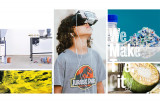
An event during WeMakeThe.City
This full-day experience at Impact Hub Amsterdam is the perfect opportunity to explore how Impact Hub makes cities more sustainable and vibrant through entrepreneurial solutions in plastics, food, inclusion, and circularity. Come get inspired by the diverse solutions of our impactmakers!
You can create your personalised schedule by purchasing tickets to the sessions you want to attend. From attending one session to spending the whole day with us - it's up to you! Learn more and sign up > bit.ly/IHA-WMTC
This event is powered by Impact Hub and the City of Amsterdam (Amsterdam Impact).
MORNING PROGRAM | OPTION 1
10:00 - 12:00 | Impact Entrepreneurs in Action: Gender, Migration and Circular Economy
We need diverse solutions to solve global and local challenges. Want to find out how YOU can make a difference and support the development of these solutions? Join this interactive session co-created by Impact Hub Amsterdam and C-Change! You’ll get inspired by impactmakers working in gender, migration and circular economy, as well as contributors from The Next Women, Crosswise Works, Generous Minds, and Circle Economy.
MORNING PROGRAM | OPTION 2
10:00 - 12:00 | Circular Strategies
To innovate for a circular economy we must narrow, slow, close and regenerate material resource and energy loops. In this two-hour session featuring Jan Konietzko from TU Delft, you will learn more about these key circular strategies. Use a brainstorm card deck developed at TU Delft to get inspired and generate circular ideas you can start implementing in your business right away! This session is part of our collaboration with the Province of Noord-Holland, which aims to become fully circular by 2050.
12:15 - 13:15 | Lunchtime: Vegan Lunch for €5
AFTERNOON PROGRAM | OPTION 1
13:30 - 15:30 | Make Your Money Green: Sustainable Investing for Newbies
You can accelerate the transition to a sustainable future by investing from as little as €250. How? Through crowdfunding! In this interactive session, crowdfunding platform Oneplanetcrowd will share all the insights you need to start investing in companies and initiatives that contribute to the Sustainable Development Goals (SDGs). You’ll also hear the crowdfunding stories of impact entrepreneurs working on the SDGs, join speed date sessions with these entrepreneurs, and more!
AFTERNOON PROGRAM | OPTION 2
16:00 - 18:00 | Perspectives on Food and Climate
In this session, the DOEN Foundation will discuss the link between climate action and sustainable food - from how the current food system contributes to climate change to how companies, consumers and policymakers can help lower food’s climate impact! Learn from experts and entrepreneurs about how the concept of ‘food’ is perceived, marketed and sold, and what impact food has on our climate.
AFTERNOON PROGRAM | OPTION 3
13:30 - 18:00 | New Plastic Ecosystem Meetup
Our second plastics ecosystem meetup is a unique opportunity to meet partners from our ecosystem, and get inspired by the next generation of entrepreneurs with solutions to reduce plastic waste worldwide! Featuring a keynote by Ellen MacArthur Foundation, roundtables and panel discussions with alumni of our Plastic Free Ocean Accelerator and partners such as the Port of Amsterdam, WWF and Accenture. Plus the chance to meet the winners of the Dopper Changemaker Challenge, and hear pitches by our Business Model Challenge| Plastics Edition participants!
EVENING PROGRAM
18:15 - 19:30 | Miha Pogacnik: Visionary, Violinist and Cultural Entrepreneur
Experience a unique performance on divergent problem-solving by world-famous violinist and visionary Miha Pogacnik. There is no right or wrong, only participation and creation.
19:00 - 23:00 Experience Impact: Heroes of Amsterdam VR Screening and Party
Frank Heckman, founder of the Embassy of the Earth, will kick off the evening session with stories of his incredible work with heroes around the world. Then, Impact Hub members Heroes & Friends will introduce us to inspiring initiatives working on the SDGs in Amsterdam.
As winners of the City of Amsterdam’s Localise the SDGs Challenge on the EU Social Challenges platform Heroes & Friends have helped these initiatives share their stories through Virtual Reality (VR) experiences!
After the talk from Heroes & Friends, it’s time for drinks, snacks and live music! You can also pop into our screening room for VR experiences of the local heroes working an inclusive and vibrant city for all.
THROUGHOUT THE DAY
The Future of Food
In addition to food for thought, we have some delicious bites to keep you running from one event to the next. Come and taste the plant-based, fairly produced treats of Meet Jack, FRANK about tea, Plant-Based Cheese, and many more!
DE GROENE AKER duurzaamheidsmarkt
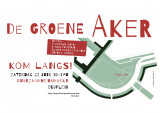
Op zaterdag 22 juni verandert het Ecuplein in het Ecoplein. Buurtbewoners hebben deze markt georganiseerd voor en door bewoners en lokale ondernemers. Thema's zijn: grondstoffen, energie, voeding, groen. Er staan rond de 30 kramen met allerhande informatie, je kunt een proefrit maken op een e-bike, een excursie naar een aardgasvrij huis, een tegel inleveren en een plant krijgen. Kortom van alles wat maar enigszins raakt aan duurzaamheid.
Circular possibilities for larger domestic waste. Event recap: Circulaire Vooruitzichten | Pakhuis de Zwijger
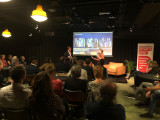
Last Thursday Amsterdam Smart City organized an open dialogue with Amsterdammers on the innovation challenge of one of its partners in Pakhuis de Zwijger. On the agenda: upcycling! What is it exactly and can we upcycle larger domestic waste? What can Amsterdam learn from others to organize this? What are the roles of the private sector and citizens in this process?
‘Many organizations struggle with a concrete way forward in transition to a circular economy, but everybody agrees that collaboration is fundamental’, according to Leonie van den Beuken, director of Amsterdam Smart City. ‘Therefore, we are happy that we can use this evening to have an open discussion with other thinkers and doers in the circular economy.’
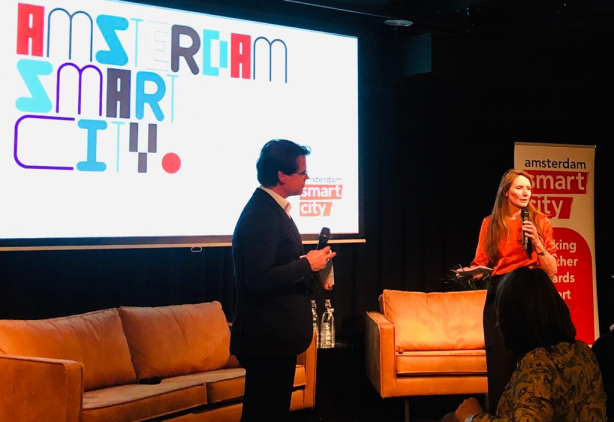
As a foundation of the discussion, Inge Oskam of the Amsterdam University of Applied Sciences shared the basic principles of the circular economy and primery talking points when turning waste into something new. By starting with the value hill she explained why it is so hard and at the same time interesting to focus on upcycling of materials. Upcycling means creating more value from recovered materials. For instance by finding new functions for the materials (repurpose). Inge showed interesting examples of repurposing: the creation of gadgets from old time tables of the railway stations and the use of an old airplane hangar for a bus terminal. Key lesson is that the conservation of existing shapes is key in the upcycle process, as the transformation of shape always costs energy and affects the business case directly.
Aside from many basics of the circular economy, Inge stressed to pay attention to a rebound effect. The true need for the circular economy comes from ecological needs. ‘Unfortunately we see that extreme success in circular businesses can create negative side effects, e.g. the use of new materials to create new products. For example, scaffolding wood is very popular for furniture nowadays. This started as a way to give wood a second life. However, due to high demand new scaffolding wood is currently made. This effect is called the rebound effect.’ Finally, Inge expressed her enthusiasm about the availability of new technologies like robotics, lasercutting and 3D printing that can drive upcycling to new levels.
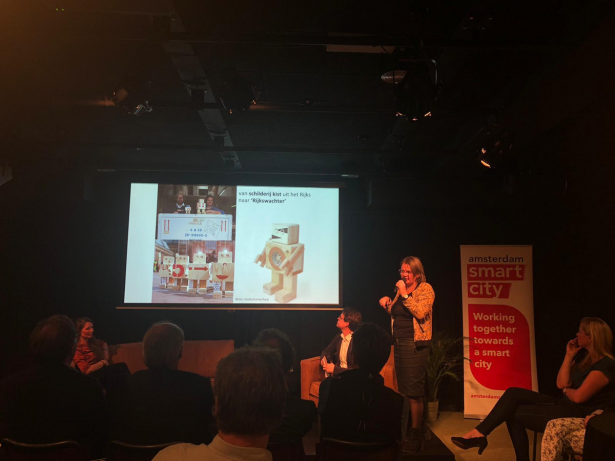
Learn from Almere
After this introduction we made the step to the innovation challenge at hand: planning a long term waste collection location in the Amsterdam Metropolitan Area, opening up to new technologies and forming public-private partnerships to make the most out of waste. Gerard Wiggers and Thomas O’Brien, representatives of the City of Amsterdam and Almere, explained existing initiatives (Almere) and planned activities (Amsterdam) about the collection of larger waste items at so-called Upcycle Centers.
The Upcycle Center Almere, opened January 2018 as a waste point, startup ecosystem and experience center under one roof. With more and more citizens in their municipality and growing ambitions with regards to sustainability, Almere turned into a frontrunner in the circular economy by building the first upcycle center. Thomas O’Brien explained that three local circular entrepreneurs are supported at the upcycle center by freely accessing the waste to use it as resource for new products. Since 2018, the Upcycle Center has shown great value to the local community. Not only are these entrepreneurs facilitated in their first stages, the Upcycle Center is also working on awareness and educational value for both citizens and students. Knowing and understanding what is done with your waste, motivates people to take waste separation efforts and go there.
The City of Amsterdam is currently researching how to facilitate new technologies for upcycling at their local waste collection locations. Amsterdam Smart City helps by sharing learnings from existing best practices like Almere, ties interesting research to the challenge, connects this challenge to regional efforts and makes optimal use of collaborative thinking of partners and citizens.
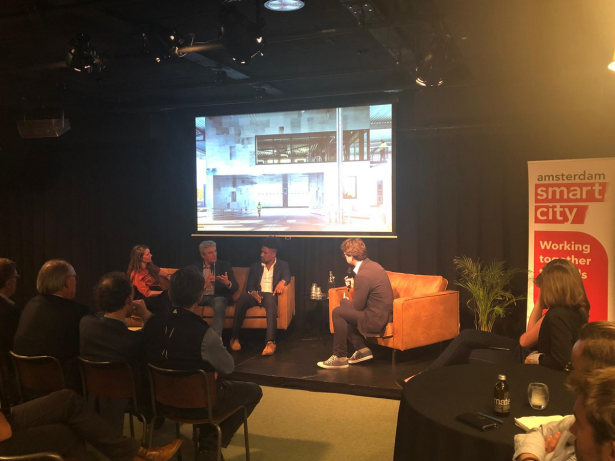
Variations new upcycle center
Amsterdam has six waste collection locations where citizens can bring their old televisions, furniture, etc. As we are renewing one of these locations, therefore doing long term investments, we want to connect to the circular economy. Currently, three variations are under consideration for a new waste facility. The buildings differ in risk sharing between public and private partners. The centers combine waste collection spaces, spaces for local craftsmanship and upcycling production facilities, logistics and customer/citizen experiences. All with consideration of local waste regulations.
Gerard Wiggers: 'We would like to consult the market and learn what the current possibilities are. Besides many activities we are doing with regards to planned logistics and hyperlocal recycling units, we need to know if private partners want to tackle the upcycling challenge for this waste stream together with us. With the creativity and entrepreneurial mindset of the market, we can show citizens the value of waste.'
Thomas O’Brien (Almere) is enthusiastic about the set-up and indicates that co-creation is crucial to optimal value and make sure that roles and responsibilities with regards to e.g. programming and activities is distributed between the most logical partners. He advises Gerard to focus on the communicative power of the upcycle center and make sure it is highly attractable for citizens to keep coming and learning why their behavior is important.
Input from the private sector
Time to query larger local waste companies about the variations of the new facility and the innovation challenge of upcycling. Both Bert-Jan van der Woude (Suez) and Gerard Veldhuijzen (Renewi) stated that circularity is the general way forward, but sometimes struggle with scale and maturity in the market. Both Suez and Renewi work on mass volume (61mln tons annually, domestic waste 9mln tons), whereas the local craftmen in e.g. Almere work on a completely different scale. Therefore, Bert-Jan believes that such an Upcycle Center has to be a learning facility, a partnership between government, knowledge institutions and private companies. With an initial focus on the educational and research value, building trust and commitment for longer term between partners rather than asking market players to take full responsibility directly.
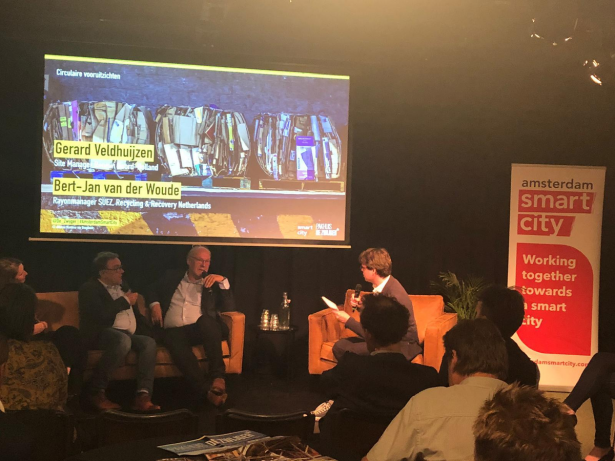
For a different perspective of waste, Tim Spekkens pitched The Upcycle. The Upcycle is a startup in Amsterdam’s historic center, collecting waste to turn into products. 'Walking around with some beers at Kingsday, I was immediately inspired by all the paper beer containers in the city streets. I found the perfect materials for the notebooks I make, lying around everywhere. This is my gold, my oil.' New local pioneers like Tim are paving the way for better usage of waste, up the value hill again. Tim was very enthusiastic about the plans of the City of Amsterdam and advised them to learn from and connect to small, local communities.
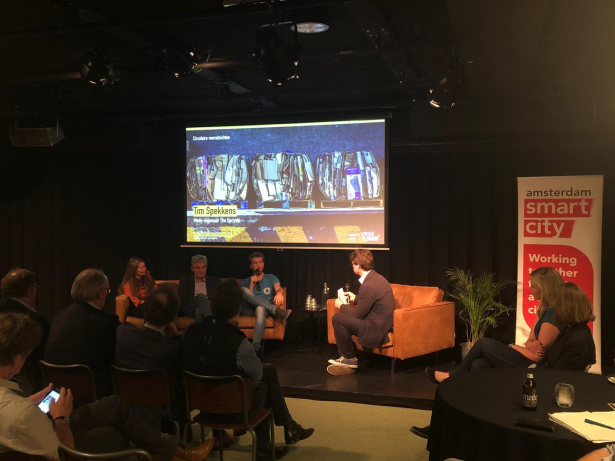
In a final wrap-up, Gerard explained the value of this effort again also in terms of communicative power. Few people really know what happens to their waste after disposing it. By opening up the process, awareness for separation of waste increases.
Did you miss the event? Don’t you worry.. You can watch the live feed at the website of Pakhuis de Zwijger (in Dutch): <https://dezwijger.nl/programma/circulaire-vooruitzichten>.
The next Amsterdam Smart City innovation challenge discussion at Pakhuis de Zwijger will be on the 15th of October, with a focus on the energy transition. Do you have interesting ideas or solutions for this challenge? Please comment below to connect!
Looking for waste upcycle center in Amsterdam Zuid.
As a new resident of Amsterdam stadsdeel Zuid, I'm looking for a place (similar to zero waste lab) or entrepeneurs to give my separated waste streams (resources). Best scenario would be that entrepeneurs can repurpose my resources into something more useful. Are there any ongoing initiatives in the neighbourhood?
Hope to hear from you,
Mirko
Circular Cities
Holland Circular Hotspot and Circle Economy launched the Circular Cities brochure at the Holland Circular Hotspot event ‘Grenzeloos Circulair’ in The Hague in April.
About Holland Circular Hotspot
Holland Circular Hotspot is a private public platform in which companies, knowledge institutes and (local) authorities collaborate internationally with the aim of exchanging knowledge and stimulating entrepreneurship in the field of circular economy.
WE MAKE THE CITY CIRCULAIR
Kom naar de ‘COMPLETE TURNOVER’, de dag waarop circulaire economie centraal staat tijdens WeMakeThe.City.
Op 19 juni staat het festival WeMakeThe.City - waar de vraag centraal staat: Hoe maken we samen steden van de toekomst? in teken van de circulaire economie! Op deze dag komen ontmoeten we Kate Raworth, de bedenker van de Donuteconomie, en Marieke van Doorninck, wethouder Duurzaamheid én alle indieners van circulaire projecten voor het Innovatie- en Uitvoeringsprogramma Circulaire Economie 2019.
Amsterdam en de Donuteconomie
De dag is opgebouwd rond de principes van de Donuteconomie (meer informatie via deze link). Hierbij gaat het niet alleen gaat om het terugdringen van CO₂-uitstoot en afval of het beschermen van de ecologie. Alles, van stikstof- en fosforstromen en chemische vervuiling tot inkomensverdeling en sociale gelijkheid, moet vallen binnen de grenzen van de donut, met een sociale ondergrens en een duurzame bovengrens.
We gaan samen aan de slag om een stad en metropool donut-proof te maken. Hierbij staan we stil bij wat we tot nu toe bereikt hebben en gaan we aan de slag om te leren van elkaars projecten. Daarnaast is er de mogelijkheid je eigen onderneming of werkomgeving donut-proof te maken.
Ben je projectindiener?
Als projectindiener heb je de mogelijkheid om jouw concept te pitchen tijdens de marktplaats voor interessante investeerders. Als je hier interesse in hebt, stuur dan een reply op deze mail, met als onderwerp ‘aanmelding pitch WMTC’.
Wil jij aanwezig zijn bij de Donutworkshop Circulaire Economie?
Meld je dan nu aan! Let op, aanmelden moet voor de verschillende onderdelen apart:
1. Presentatie van met Kate Raworth over de donuteconomie; aanmelden kan hier: https://wemakethe.city/production/circular-economy
2. Marktplaats circulaire initiatieven; aanmelden kan hier: https://wemakethe.city/production/market-place-circulair-economy
3. Workshop Maak je onderneming of werkplek donut-proof; verzeker je hier van een plek:
https://wemakethe.city/production/making-your-own-enterprise-doughnut-proof-with-kate-raworth
Meer informatie en het hele programma vind je hier:
https://wemakethe.city/production/circular-economy?ref=17109&lang&q=donut
We zien je graag op 19 juni as.!
Circulaire vooruitzichten
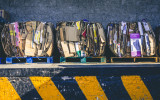
Samen met Pakhuis de Zwijger organiseert Amsterdam Smart City een avond over circulaire economie in de Metropoolregio! Kom je ook?
Hoe zien circulaire steden er straks uit?
Steden waarin al het afval volledig wordt gerecycled. Het klinkt als een ideaalbeeld, maar hoe komen we daar? En hoe betrekken we bewoners zo goed mogelijk bij de processen die hierbij nodig zijn? Tijdens dit programma kijken we naar verschillende projecten rondom circulariteit en afvalverwerking van Amsterdam Smart City. Afval kunnen we gebruiken als grondstof voor nieuwe producten, zowel op lokaal als centraal niveau. Hoe zorgen we ervoor dat grote bedrijven en bewoners zo goed mogelijk worden betrokken bij het proces van afvalverwerking? Hoe blijft het aantrekkelijk voor al deze partijen? Kortom: hoe ziet circulaire afvalverwerking er straks uit?
Introducing a new MOOC: Nature Based Metropolitan Solutions

Our new and third MOOC will start on May 21. During this course you will discover the potential benefits of nature-based solutions (NBS) in metropolitan areas and develop strategies for their implementation.
Unsustainable urbanization has resulted in the loss of biodiversity, the destruction of habitats and has therefore limited the ability of ecosystems to deliver the advantages they could confer. How can ecosystems contribute to quality of life and a more livable, healthier and more resilient urban environment?
Our third MOOC will introduce you to Nature-Based Solutions (NBS). NBS are potential solutions to metropolitan challenges that include principles based on natural processes in urban planning and design.
More info and how to enroll: https://www.ams-institute.org/news/mooc-iii-nature-based-metropolitan-solutions/
CINDERELA conference: Establishing a Blueprint for a resource-efficient construction sector
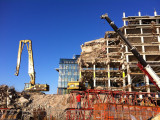
CINDERELA is a European consortium aimed at reducing the loss of raw materials in the construction sector with the aim of working towards circular construction. On Thursday 23 May we will share and discuss our results.
On behalf of the CINDERELA consortium, together with the Delft University of Technology and KplusV, we are proud to invite all interested actors and stakeholders active in the construction sector to work together to define key enabling actions that will serve as the foundation for a ‘Blueprint for a resource-efficient secondary raw material based construction sector’, an official document that will be part of the H2020 CINDERELA project New Circular Economy Business Models for More Sustainable Urban Construction.
Podcast: what is the circular economy?
What is the circular economy? Who's doing it? And what are some of the best examples of it in action? The Ellen MacArthur foundation launched a new podcast series on circular economy. Explaining - in simple terms & using tangible examples - what a circular economy is. For those interested in learning more, it's definitely worth a listen!
23/05: Amsterdam Smart City is organizing an evening on circular economy at Pakhuis de Zwijger (in Dutch). For more information check out their website:
https://dezwijger.nl/programma/circulaire-vooruitzichten
Looking for a job opportunity in the areas of smart cities / digital transformation
I am a Smart Cities Consultant, actively looking for opportunities in the areas of Smart Cities, Digital Transformation, Livable Cities, Sustainable Development, Urban Mobility, ICT/ IoT, Strategy Planning, Project Management, Urban Management, Urban Economic Development, Urban Governance, Feasibility Studies, Technical Research, and Development.
I hold a Masters degree from Germany with specialization in Urban Agglomerations. I would be happy to hear from you pointing out at any leads or opportunities.
Thanks in advance,
Kind Regards,
Anuradha
Stay up to date
Get notified about new updates, opportunities or events that match your interests.

